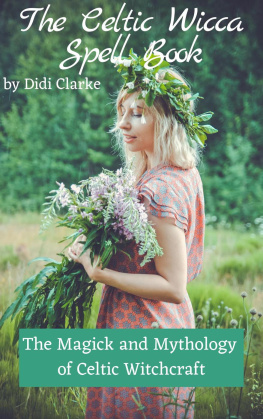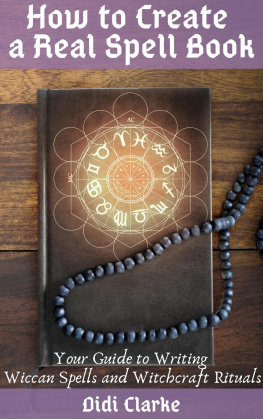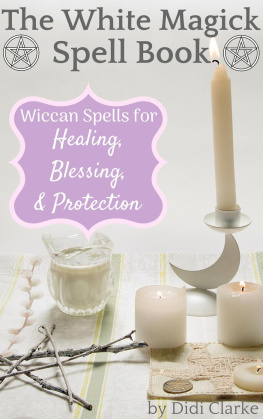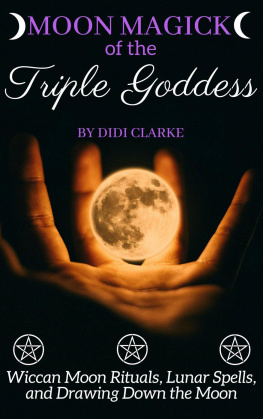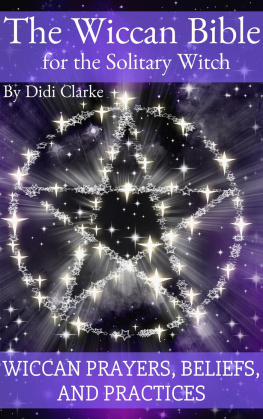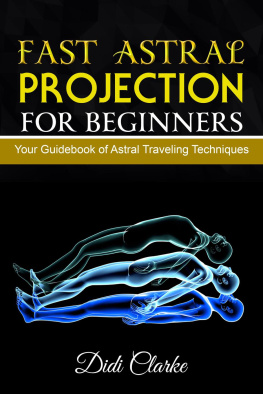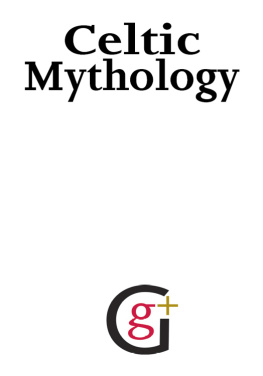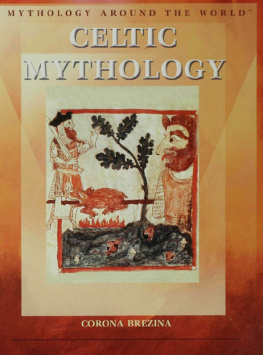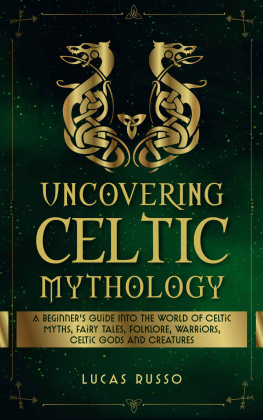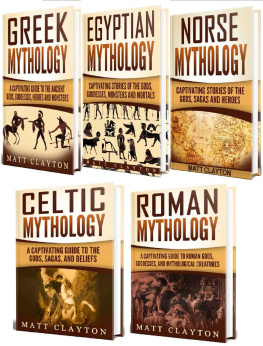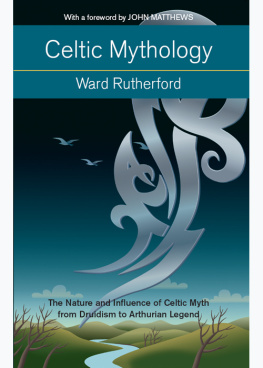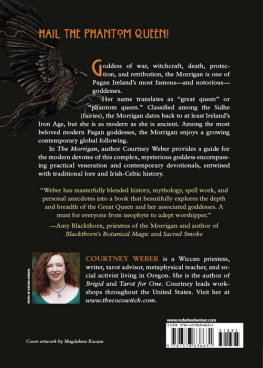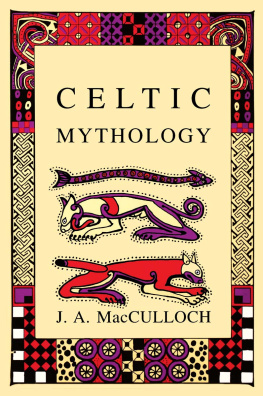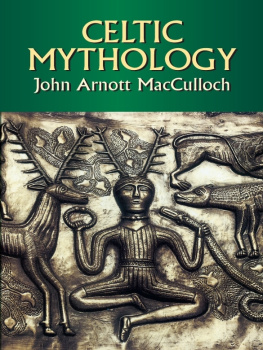If youd like to be notified when I publish a new book or have something exciting in the works, be sure to sign up for my mailing list . Youll receive a FREE color magick correspondence chart when you do! Click here to subscribe.
While every precaution has been taken in the preparation of this book, the publisher assumes no responsibility for errors or omissions, or for damages resulting from the use of the information contained herein.
THE CELTIC WICCA SPELL BOOK: THE MAGICK AND MYTHOLOGY OF CELTIC WITCHCRAFT
First edition. July 28, 2019.
Copyright 2019 Didi Clarke.
ISBN: 978-1393041047
Written by Didi Clarke.
10 9 8 7 6 5 4 3 2 1
Also by Didi Clarke
Forbidden Wiccan Spells
Forbidden Wiccan Spells: Magick for Love and Power
Forbidden Wiccan Spells: Magick for Wealth and Prosperity
Forbidden Wiccan Spells: Dark Goddess Magick
Forbidden Wiccan Spells: Tarot Cards and Psychic Development Rituals
Herbs for Witchcraft
Herbs for Witchcraft: The Green Witches' Grimoire of Plant Magick
Herbs for Witchcraft: The Green Witches' Grimoire of Love Potions and Love Spells
Standalone
Fast Astral Projection for Beginners: Your Guidebook of Astral Traveling Techniques
The Ritual Magick Manual: High Magick, Ceremonial Magick, and Pagan Rituals
Moon Magick of the Triple Goddess: Wiccan Moon Rituals, Lunar Spells, and Drawing Down the Moon
The White Magick Spell Book: Wiccan Spells for Healing, Blessing, and Protection
The Wiccan Bible for the Solitary Witch: Wiccan Prayers, Beliefs, and Practices
The Wiccan Handbook of Candle Spells: Real Magick for Real Witches
How to Create a Real Spell Book: Your Guide to Writing Wiccan Spells and Witchcraft Rituals
The Celtic Wicca Spell Book: The Magick and Mythology of Celtic Witchcraft
The Wiccan Wheel of the Year: A Witch's Guide to Celebrating the Wiccan Sabbats (Coming Soon)
Chapter 1: The Path of Celtic Wicca
T he fantastic and fanciful stories of Celtic gods and goddesses have been around for thousands of years. If you thought that the Greek pantheon was full of drama and intrigue, just wait until you meet the Celts!
And even though you might not realize it, these Celtic deities play a major role in the practice of modern-day Wicca. I would go as far as to say that Wicca and Celtic mythology are in some ways inseparable. And Im excited to get to share these fascinating gods and goddesses with you.
In The Celtic Wicca Spell Book , well journey through the Celtic pantheon where youll be introduced to gods like Dagdathe good godand goddesses like Morriganthe warrior goddess. However, this book is much more than just an explainer. Its a spell book too!
After introducing you to each god or goddess, youll find an original invocation spell for calling down the power of that specific deity. These include rituals like:
- Invocation to honor the dead
- Invocation for bravery
- Invocation for starting a new chapter in your life
- And many more!
So Who Were the Celts? What is Celtic?
B efore we get to the deities themselves, I think its important to give a little background information about the Celtic people, Celtic mythology, and how they tie into witchcraft.
First, the basic answerthe Celts were an ancient group of people who lived in parts of Europe. These include areas like the Alps near France and Italy. But when most people think of the Celts, theyre thinking about those who traditionally lived on the British Isles.
Now, the historical answeracademics typically consider the Celts to be any group of people that spoke a traditional Celtic language. This is useful definition because it accounts for Celts in unusual geographic locations (like those in Iberia).
For the purposes of this book, a majority (if not all) of the gods and goddesses I mention were traditionally worshipped in the British Isles.
As far as the term Celtic goes, it refers to anything associated with these traditional Celtic peopleas well as modern-day Celts, like the Irish and Scottish.
How Do Celtic Deities Relate to Modern-Day Wicca?
M odern Wicca and the ancient Celtic religion are not one and the same. Youll find some misguided witches who believe that when they practice Wicca, they are practicing the same religion as the Celts.
However, this is simply not the case. And that largely has to do with the fact that much about ancient Celtic religion and its practices has been lost to time. How can we say were practicing their religion when we know so little about how they themselves practiced it?
One thing that has survived into the modern day are their myths, their gods and goddesses. And this is were the link between Wiccan and the past begins.
Traditional Wicca and Celtic Wicca
T hese days, there are too many different branches of Wicca to effectively track them all! People have expanded upon this religion in some surprising and powerful ways.
However, one of the earliest traditional forms of Wicca was created by famed occultist Gerald Gardner. His form of witchcraft was not explicitly Celtic, but you can definitely see the influence that the Celtic pantheon had on his practice.
For example, we have the Triple Goddess and Horned God as the principal deities of traditional Wicca. While the idea of a triple goddess is not exclusive to the Celts, they definitely had their fair share of goddess who fill this roleand well see them in fuller detail later.
Additionally, Gardner sometimes referred to the Horned God as Cernunnos or Kernunnonames directly lifted from Celtic mythology. Youll find Cernunnos and his invocation in just a few chapters.
These and other things point to a Celtic influence within traditional Gardnerian Wicca. But the link between the two is made entirely explicit within the Celtic Wicca branch.
In Celtic Wicca, most practitioners leave the major tenets of traditional Wicca intact. It is instead an expansion of traditional Wicca by incorporating Celtic elements into the mix. This includes identifying the Triple Goddess and Horned God as the Celtic deities Brigid and Cernunnos, working with other Celtic deities, and a strong appreciation for nature.
Ultimately, Celtic Wicca is a blend of both old and new. Its not the traditional religious system of these ancient people, but rather is a reimagining of these ancient myths and deities. This sort of syncretic, eclectic approach is not everyones cup of tea, but I think youll find that this path offers a powerful mix of being connected to the past and excited for the future.
Discover Celtic Wicca for Yourself
A re you ready to experience the power of Celtic Wicca for yourself? These fascinating gods and goddesses await, so lets get started!
Next page
